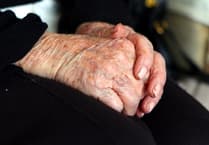THE Independent Office for Police Conduct (IOPC) has today (October 24) informed Devon and Cornwall Police that it has withdrawn its decision to direct misconduct hearings against two detention officers involved in the detention of former Crediton man, Thomas Orchard, prior to his death in Exeter in 2012.
Thomas Orchard (32), died seven days after having an emergency response belt placed across his face in October 2012.
The Orchard family has said that the decision felt “outrageously” wrong.
The family added that it had been “let down by the IOPC” and also called on the coroner to “examine the circumstances surrounding Thomas’ death publicly, openly, honestly and constructively”.
In May 2019, Devon and Cornwall Police was sentenced and fined £234,500 for health and safety breaches in relation to the belt used after Mr Orchard was arrested in Exeter.
Judge Julian Lambert ruled he could not be sure the belt placed around Mr Orchard’s face contributed to his death in April 2019.
It was on October 3, 2012, that Mr Orchard, who suffered with paranoid schizophrenia, was arrested for shouting at members of the public and transported to the Royal Devon and Exeter Hospital after being resuscitated at Heavitree Road Police Station.
The restraint belt was placed across his face for five minutes and two seconds to prevent spitting or biting while at the police station.
He was declared dead seven days later on October 12.
In July, a preliminary hearing was held for four Devon and Cornwall Police officers facing misconduct allegations and an independent panel ruled the allegations should be dismissed as the officers could not have a fair hearing.
A panel found that the delays in the case had been "excessive and unjustified" for both the family and the officers concerned.
Andrew Berry, chair of Devon and Cornwall Police Federation, said that the Federation has called for an investigation looking into "what went wrong with disclosure" and "how the disciplinary case could drag on for seven years".
Chief Constable Shaun Sawyer said about the latest decision: “In July 2019, an independent panel made the decision to dismiss the misconduct allegation against four Devon and Cornwall Police officers, which led to the IOPC withdrawing their decision to direct misconduct hearings. However, two remaining detention officers who fall under different regulations to the police officers, would have still faced a separate hearing.
“Today (October 24), the IOPC has informed us that they have withdrawn the decision to direct misconduct hearings for the two detention officers.
“A key factor in this decision was the Force admitted earlier this year that we had committed a health and safety offence contrary to the Health and Safety at Work Act 1974, in relation to the use of the Emergency Response Belt (ERB).
“Whilst I welcome today’s decision, I understand the significant impact of this long-running matter on staff, officers and their families, and of course the family of Thomas Orchard.
“We are happy to accept the offer from the IOPC to meet with them to further discuss lessons learned.”
Chief Constable James Vaughan, of Dorset Police, said: “As the appropriate authority, I welcome the decision to bring the proceedings to a close.
“The IOPC have made particular reference to a recent HMICFRS report which recognised the improvements that Devon and Cornwall Police have made to how the force care for people in custody.”
Due to all parties still awaiting information in relation to a potential future inquest, Devon and Cornwall Police said it will not be making further comment at this time.
Previously, in May, in mitigation, the force said the belt had been used around 500 times about the head on other people and without reports of injury before Mr Orchard’s death.
During the hearing Mark Heywood QC for the prosecution read an extract of a victim personal statement by Mr Orchard’s mother Alison. She described the impact of the church caretaker’s death on his family.
“It has been painful to witness how an organisation which had a duty of care for Thomas was so casual, disorganised and sloppy in their approach to health and safety,” she said.
“Perhaps the hardest thing to hear was how Thomas’s detention could have and should have been managed.”
She said the family’s faith in Devon and Cornwall Police had been “tarnished” and they had been left “fearful” of how they would be treated by officers.
Jason Beer QC, representing the force, said any fine would have to be funded by a halt in recruitment. Every £100,000 fine would result in a reduction of three recruits for Devon and Cornwall Police, he said.
“It took the occurrence of Mr Orchard’s tragic death to reveal errors in the procurement, risk assessment and training procedures in the force,” Mr Beer told the court. “The use of the device did not, on the evidence, cause actual harm to any person.”
Speaking outside court, Mr Orchard’s father Ken Orchard said the family were leaving court with “no sense of real justice”.
“Investigations over the past six-and-a-half years have highlighted some criminally appalling health and safety practices which desperately needed changing,” he said. “We hope more than anything that the residents of Devon and Cornwall will be at least a little safer today as a result of Thomas’s death.”
‘WONDERFUL’ PERSON
Thomas Orchard was described as a “wonderful human being who was loved dearly” by his family in a statement, released in full on the website of the charity Inquest, which has been supporting the family.
It began: “Everything in our lives is measured as having taken place either before or after Thomas died, such was the trauma of his death. Thomas was a wonderful human being who was loved dearly by his family and we think about him with sadness every day.
“We miss his quirky sense of humour, his oftentimes deep and perceptive comments and his huge presence. We miss witnessing the fulfilment he found in everyday life and his faith; his love of runner beans and cats; crosses and candles.”
Mr Orchard had been making “real progress” and was living semi-independently at the time of his death – with his provisional driving licence arriving in the post the day after he died.
His family said they “grieve doubly” for Mr Orchard because of the hole left but also the future he does not have, such as seeing his brother get married or his nephews grow up.
The family said they were “not confident” that failures had been recognised and genuine changes made, adding they feared other safety issues may remain unidentified.
“From a personal perspective, we are fearful of how we would be treated if we needed to call the police,” they said.
They added that to have some good come of Mr Orchard’s death, such as accountability, changes in policy and a shift in police attitudes towards vulnerable people would “go some way towards our healing”.
ANGER
The Orchard family expressed anger that the force had still not apologised to them.
In the statement, they spoke of the pressure the case had put on them and their distress at how Thomas had sometimes been depicted during the court process.
“It has been hard to hear Thomas defined as an ‘angry man’ when we know he would have been a frightened one; to hear his behaviour described as ‘violent’ at times when we know he was fighting for his life; to hear the effect of his detention compared to that of the capture of a ‘non-human animal’; and to hear that officers thought he was ‘sleeping’ or ‘compliant’ when we know he was probably unconscious or even dead,” they said.
The family’s solicitor, Helen Stone of Hickman and Rose, said: “This case is significant because it has exposed the worryingly haphazard way the UK’s police forces obtain and use the specialist equipment they deploy on Britain’s streets.
“Currently there is no national oversight of the way this equipment is procured, tested and used. Each force is effectively able to make its own decisions – and its own deadly mistakes. This is deeply concerning.”
Deborah Coles, the executive director of the charity Inquest, said: “The sentence should be a wake-up call to the Home Office and all police forces, who are failing to ensure there is systemic consideration of safety when introducing new, varied and potentially unsafe equipment into custody settings.”
Two civilian staff are still facing disciplinary proceedings.




